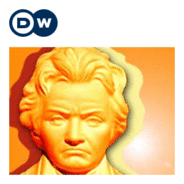Israeli violinist Shlomo Mintz pays homage to the unforgettable Austrian violinist Fritz Kreisler at Bonn's Beethovenfest.Fritz Kreisler (1875-1962)
Recitativo and Scherzo-Caprice, op. 6
Shlomo Mintz (violin)
MP3 recorded in the Beethoven Hall, Bonn, on October 4, 2010 by Deutsche Welle (DW)
Viennese violinist Fritz Kreisler wrote his "Recitativo and Scherzo-Caprice" in 1911 for his friend and teacher Eugene Ysaye. Shlomo Mintz launches a firework of violin virtuosity, passion and emotion in this charming, colorful composition by the erstwhile "king of the violin."
Mintz was born in Moscow in 1957 and emigrated to Israel with his parents two years later. He debuted at age 11 with the Israel Philharmonica Orchestra under Zubin Metha. At age 16 came his first dazzling performance at New York's Carnegie Hall.
Mintz has conducted many notable orchestras. His recordings on the Deutsche Grammophon label have garnered prizes such as the Grand Prix du Disque and the Edison Award. Shlomo Mintz received an honorary doctorate from Israel's Ben Gurion University in 2006.
Author: Marita Berg (als)
Editor: Rick Fulker

Klassische Musik
Beethoven | Deutsche Welle Folgen
Beethoven's most famous symphonies performed by excellent young orchestras and new compositions by award-winning composers: a free musical experience offered by Deutsche Welle
Folgen von Beethoven | Deutsche Welle
50 Folgen
-
Folge vom 13.10.2010Beethoven and more podcast #14: Viennese charm
-
Folge vom 13.10.2010Beethoven and more podcast #13: A stormy poetic dialogueWith their passion and spirit, Brazilian youth orchestra Sinfonica Heliopolis shows that listeners can discover new elements and nuances even in oft-played works.Pjotr Il'yich Tchaikovsky (1840-1893) Violin Concerto in D Major, op. 35 Shlomo Mintz (violin) Sinfonica Heliopolis Conductor: Roberto Tibirica MP3 recorded in the Beethoven Hall, Bonn, on October 4, 2010 by Deutsche Welle (DW) The 80 members of Sinfonica Heliopolis come from the favelas, Brazil's poorest neighborhoods. The 13 to 24-year-olds receive their musical training at Sao Paulo's Instituto Baccarelli, located in the Heliopolis slum, which offers them not only social and professional prospects, but also helps them enjoy life. The rather depressive Pjotr Tchaikovsky was often able to find hope and energy in music, and composing his Violin Concerto in particular helped him out of an extreme bout of depression. Writing to a friend at the time, he enthusiastically said: "The canzonetta is downright exquisite! What poetry and what yearning in these sons voiles, these mysterious notes!" This violin concerto is full of emotion - stormy, exuberant, melancholy and filled with longing. Shlomo Mintz and the Sinfonica Heliopolis maintain a stormy, poetic dialogue with Tchaikovsky's work. Author: Marita Berg (als) Editor: Rick Fulker
-
Folge vom 13.10.2010Beethoven and more podcast #12: City of the Sun, City of DreamsAndre Mehmari's "Cidade do Sol" is intended to bridge cultures and offer hope. To that end, the Brazilian visionary cooperates closely with the Sinfonica Heliopolis, based in Sao Paulo's poorest neighborhood.Andre Mehmari (1977-) Cidade do Sol (world premiere, commissioned by Deutsche Welle) Sinfonica Heliopolis Conductor: Roberto Tibirica MP3 recorded in the Beethoven Hall, Bonn, on October 4, 2010 by Deutsche Welle (DW) Deutsche Welle commissioned 33-year-old Andre Mehmari with the work "Cidade do Sol," which premiered on Oct. 4. The composer's intention is to bridge Brazilian and European cultures - by employing Brazilian rhythms on the one hand and echoes of Franz Schubert's Lieder "Heliopolis 1" and "Heliopolis 2" on the other. "Cidade do Sol" is a colorful composition that plays with opposites - a kind of Brazilian version of Leonard Bernstein's "West Side Story," with some spirited samba and bossa nova rhythms thrown in. The musicians in the Sinfonica Heliopolis all come from Sao Paulo's largest favela, or shanty town. Playing music offers them the chance to escape life in the slums. The title "City of the Sun" thus points to the dream of a better life becoming reality through music. Author: Marita Berg (als) Editor: Rick Fulker
-
Folge vom 06.10.2010Beethoven and more podcast #9: An ode to the 'master of masters'In this symphony, Bruckner honors Richard Wagner, the "master of all masters," and at this concert the Beethovenfest honored a conductor for his "standard-setting interpretations."Anton Bruckner (1824-1896) Symphony No. 7 in E Major, 2nd movement: Adagio sehr feierlich und sehr langsam Bavarian State Orchestra Conductor: Kent Nagano MP3 recorded in the Beethoven Hall, Bonn on September 12, 2010 by West German Radio, Cologne (WDR) It wasn't until the premiere of his Seventh Symphony that Bruckner achieved wide-reaching recognition. The first performances in 1884 and 1885 were the breakthrough for the composer, who was painfully shy and often suffered from a lack of self-esteem. We've chosen the Adagio movement for you. Connections to a composer's biography are relatively rare in symphonies, but this one is an exception: after Bruckner heard of the death of Richard Wagner in early 1883, he set the conclusion of the Adagio as a funeral ode for Wagner, whom he called his personal "master of all masters." At this concert in the Beethoven Hall, American conductor Kent Nagano was honored with the Wilhelm Furtwaengler Prize. Furtwaengler is considered one of the 20th century's foremost conductors. Since 2008, the prize has been awarded at the Beethovenfest. With this, writes Ermano Sens-Grosholz, patron of the award, Nagano is recognized as an "exemplary artist with standard-setting musical achievements and for his engagement for social causes and projects, in particular with regard to the education of musical youth." Author: Rick Fulker Editor: Greg Wiser
